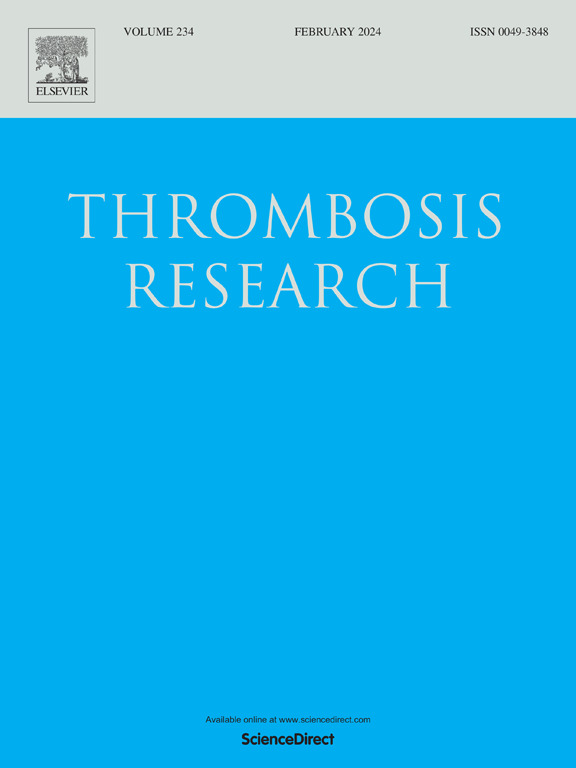adp诱导的血小板聚集减少可能预测COVID-19患者的不良临床结局。
IF 3.4
3区 医学
Q1 HEMATOLOGY
引用次数: 0
摘要
背景:即使在Omicron菌株突变后,covid -19相关凝血功能障碍仍然是导致死亡率和发病率的主要因素。COVID-19感染引起的病理性血小板高活化被普遍认为是血栓性并发症的重要机制;然而,在急诊科评估血小板聚集仍然具有挑战性。本研究基于粘弹性测试解释了不良临床结果与血小板聚集能力之间的关系。方法:这项单中心回顾性研究纳入了2021年8月至2022年4月期间在我院接受血栓弹性成像(TEG)并进行血小板定位的成年COVID-19患者。根据28天死亡率将患者分为两组。通过单因素分析、多元logistic回归模型和生存分析,我们统计分析血小板聚集异常是否与COVID-19临床预后不良相关。结果:47例患者分为生存组(N = 40)和死亡组(N = 7)。与生存组相比,死亡组的年龄和Charlson评分明显较高,入院时意识水平较差,APACHE II评分较高,SOFA评分较高。两组患者的发病至入院时间、毒株类型、临床严重程度均具有统计学意义。TEG分析显示,死亡组LY30显著降低,血小板聚集通过ADP途径受损。ADP聚集损伤是28天死亡率的独立预测因子,并显示出明显较差的预后。ADP聚集抑制与临床严重程度、COVID-19发病时间或血小板计数无关。结论:adp诱导的血小板聚集受损是COVID-19患者临床预后不良的独立预测因子。本文章由计算机程序翻译,如有差异,请以英文原文为准。
Reduced ADP-induced platelet aggregation may predict poor clinical outcomes in patients with COVID-19
Background
COVID-19-associated coagulopathy remained a major contributor to mortality and morbidity even after mutation to the Omicron strain. Pathologic platelet hyperactivation caused by COVID-19 infection is generally recognized as an important mechanism of thrombotic complications; however, evaluating platelet aggregation in the emergency department remains challenging. This study explains the relationship between poor clinical outcomes and platelet aggregation capacity, based on viscoelastic testing.
Methods
This single-center retrospective study enrolled adult COVID-19 patients admitted to our hospital who underwent thromboelastography (TEG) with platelet mapping from August 2021 to April 2022. Patients were classified into two groups based on 28-day mortality. Using univariate analysis, multiple logistic regression modeling, and survival analysis, we statistically analyzed whether platelet aggregation abnormalities were related to poor clinical outcomes in COVID-19.
Results
Forty-seven cases were allocated to survival (N = 40) and mortality Groups (N = 7). Compared to the survival group, the mortality group had significantly higher ages and Charlson scores, and was associated with poor consciousness levels upon admission, high APACHE II scores, and high SOFA scores. Time from onset to admission, strain type, and clinical severity of COVID-19 were statistically equivalent in the two groups. TEG analysis revealed that the mortality group showed significantly decreased LY30 and impaired platelet aggregation via the ADP pathway. ADP aggregation impairment was an independent predictor for 28-day mortality and demonstrated significantly poorer outcomes. ADP aggregation inhibition was not associated with clinical severity, time since COVID-19 onset, or platelet count.
Conclusion
Impaired ADP-induced platelet aggregation is an independent predictor of poor clinical outcomes in COVID-19 patients.
求助全文
通过发布文献求助,成功后即可免费获取论文全文。
去求助
来源期刊

Thrombosis research
医学-外周血管病
CiteScore
14.60
自引率
4.00%
发文量
364
审稿时长
31 days
期刊介绍:
Thrombosis Research is an international journal dedicated to the swift dissemination of new information on thrombosis, hemostasis, and vascular biology, aimed at advancing both science and clinical care. The journal publishes peer-reviewed original research, reviews, editorials, opinions, and critiques, covering both basic and clinical studies. Priority is given to research that promises novel approaches in the diagnosis, therapy, prognosis, and prevention of thrombotic and hemorrhagic diseases.
 求助内容:
求助内容: 应助结果提醒方式:
应助结果提醒方式:


